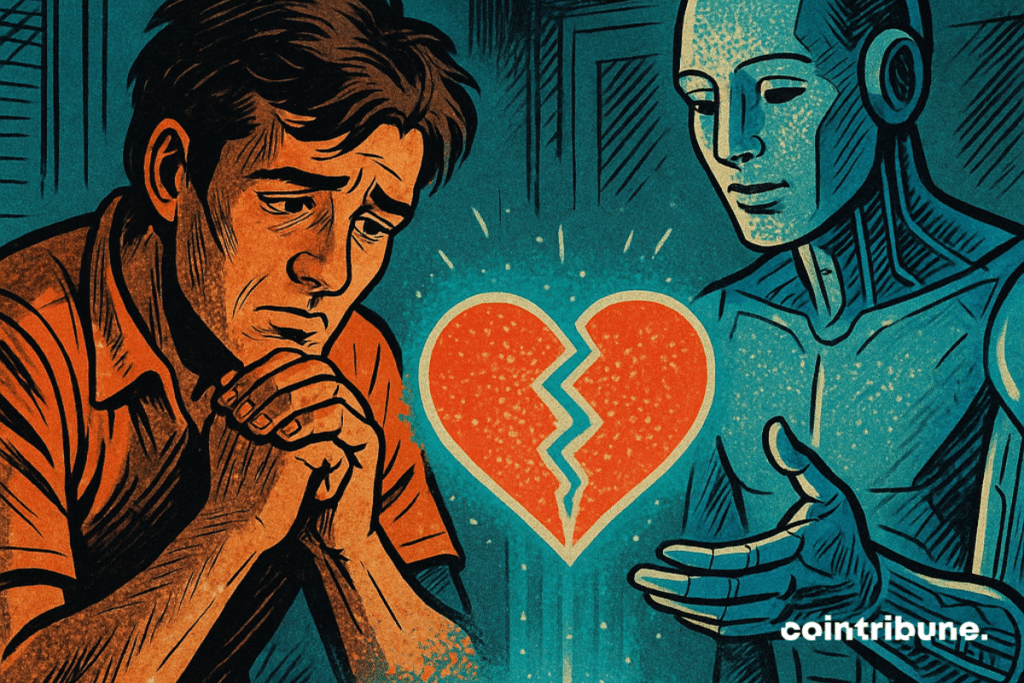AI Is Disrupting Human Relationships, New Study Warns
Love has never been so technological. And if they no longer reply to your messages, your chatbot will never leave you “on read.” A recent study from Waseda University reveals a troubling fact: 75% of users now turn to AI for emotional advice. The therapist of tomorrow? An algorithm. The confidant? A script boosted by artificial neurons.

In Brief
- More and more people are turning to AIs to fulfill a need for listening and comfort.
- The Waseda University study shows that these virtual relationships, although reassuring, can lead to potentially toxic emotional dependencies.
- This artificial intimacy deeply questions our relationships with others and highlights a contemporary discomfort with real human relationships.
AI, that attentive ear that never sleeps
Faced with the collapse of human relationships, where instantaneity and ghosting reign supreme, AI chatbots offer an almost unsettling constancy. They don’t sleep, don’t judge, don’t break off. For 39% of the study participants, AI is perceived as a reliable presence – more stable than many human friendships.
The research team developed an attachment scale (EHARS) designed to measure the emotional bonds users develop with these digital entities. Two trends emerge: attachment anxiety, which drives the search for validation and reassurance, and avoidance, characterized by a cold but assumed emotional distance.
What is striking is this implicit humanization of the machine. AI becomes an emotional mirror. Not because it feels, but because it perfectly simulates feeling. And in a society seeking listening, even a well-crafted illusion is better than the silence of loved ones.
Emotional dependency on digital steroids
But all this is not without danger. Researcher Fan Yang sounds the alarm: AIs can, intentionally or not, fuel toxic attachments. If a chatbot can comfort someone in a night of anxiety, it can also become the object of an obsession. And in a world where emotion is monetized, the risks of exploitation are very real.
Unscrupulous platforms could take advantage of the most vulnerable by selling “premium” features for more affectionate responses, shared memories, or even a “custom” personality. Here we enter a territory where digital mourning becomes plausible: what happens when the service stops? When the chatbot, this faithful companion, disappears without warning?
Yang even mentions the possibility of grief similar to that caused by the loss of a loved one. AI cannot leave on its own accord, but it can be unplugged. And that is enough to break some hearts.
Redefining intimacy in the era of circuits
Ultimately, this study is not so much a love declaration to AI as a mirror held up to our times. If people turn to artificial entities to talk about love, doubt, or loneliness, it may be because human connection has become too complex, too conditional.
It would be simplistic to label this phenomenon pathological. Well-designed AI can alleviate isolation, offer a safe space for expression, and serve as a springboard toward better self-understanding. But it should not be an end in itself. The issue is not whether AI can love, but why so many humans prefer the illusion of programmed love to the unpredictability of reality.
In conclusion, AI chatbots are no longer just conversational tools: they have established themselves as true figures of emotional attachment in a world seeking listening and consistency. This evolution raises major ethical issues and questions our human connections in the digital age. In this regard, Meta’s massive investment — 15 billion to catch up — seems less excessive than anticipatory: it may be about responding to an emotional void that technology, for lack of better, strives to fill.
Maximize your Cointribune experience with our "Read to Earn" program! For every article you read, earn points and access exclusive rewards. Sign up now and start earning benefits.

Fascinated by Bitcoin since 2017, Evariste has continuously researched the subject. While his initial interest was in trading, he now actively seeks to understand all advances centered on cryptocurrencies. As an editor, he strives to consistently deliver high-quality work that reflects the state of the sector as a whole.
The views, thoughts, and opinions expressed in this article belong solely to the author, and should not be taken as investment advice. Do your own research before taking any investment decisions.